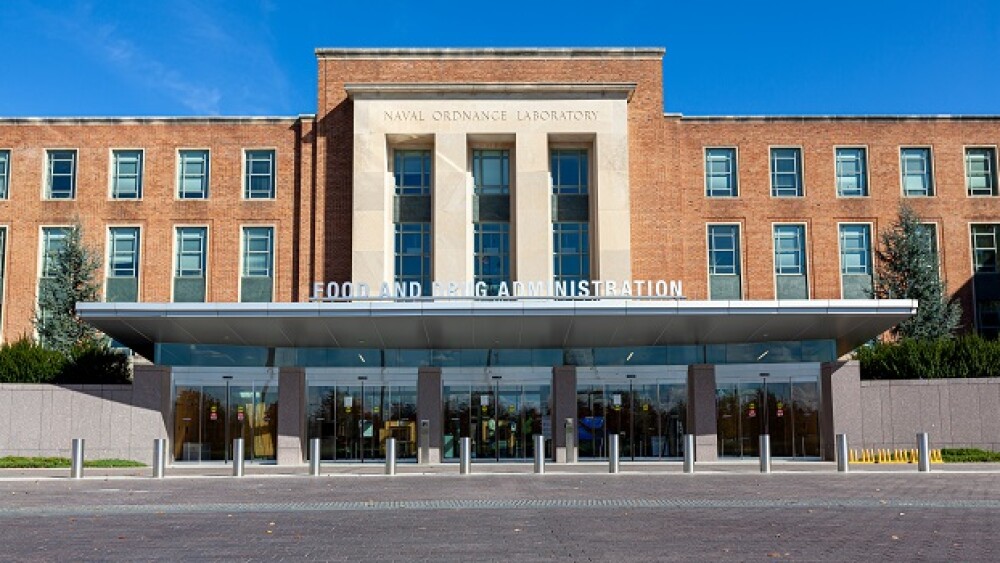The FDA’s Antimicrobial Drugs Advisory Committee voted 21–0 that the companies’ respiratory syncytial virus antibody, nirsevimab, has a favorable benefit-risk profile in infants and young children.
Pictured: FDA Building/courtesy of Grandbrothers/Adobe Stock
The FDA’s Antimicrobial Drugs Advisory Committee voted unanimously Thursday to recommend the approval of AstraZeneca and Sanofi’s respiratory syncytial virus antibody, nirsevimab, for use in the pediatric setting.
In a 21–0 vote, the panel of external experts agreed that the immunizing antibody had a favorable benefit-risk profile for the prevention of RSV-associated lower respiratory tract disease (LRTD) in infants who are born during or are entering their first RSV season.
“There was no real significant safety signal to worry about, there was no real viral breakthrough,” Michael Green, professor of pediatrics, surgery and clinical and translational science at the University of Pittsburgh School of Medicine, said during the meeting in explaining his vote.
Green also commended nirsevimab’s efficacy data showing that it met its primary and key secondary endpoints.
“I think that ... expanding the availability of this RSV protective strategy to all children less than 12 months of age” will be beneficial, Green said. “The value of giving it as a single dose is going to make its operational implementation much easier and assure, hopefully, a more equitable availability of the product.”
Separately, the committee voted 19–2 in recommending nirsevimab’s approval for use in high-risk children up to two years of age who remain vulnerable to severe RSV through their second season.
The FDA is set to release its regulatory verdict for nirsevimab in the third quarter of 2023. The regulator is not bound to follow the recommendations of its advisory committees, though it often does. Nirsevimab is already approved in Europe where it is marketed under the brand name Befortus.
If approved, nirsevimab would become the first immunization option specifically designed to protect all infants through their first RSV season, according to Sanofi’s news release announcing Thursday’s vote.
Developed originally by AstraZeneca, nirsevimab is an investigational long-acting antibody that targets and binds to the part of the RSV virus that attaches to the host’s cells. This mechanism of action enables nirsevimab to block the virus from entering its target cells, block infection at a cellular level and, in turn, induce passive immunity in infants and young children.
For an upfront payment of around $130 million, Sanofi bought into nirsevimab’s potential in 2017 through its vaccines arm Sanofi Pasteur.
In a briefing document released ahead of the adcomm meeting, the FDA highlighted nirsevimab’s efficacy, which AstraZeneca and Sanofi presented using data from two trials. Taken together, the immunizing antibody led to an at-least 70% relative risk reduction in RSV-related LRTD.
Nirsevimab’s data package included three trials, though the third was “not designed or powered to evaluate efficacy,” the FDA’s reviewers wrote in the briefing document. Instead, this third study demonstrated that nirsevimab was safe with an overall favorable side effect profile.
Still, the FDA flagged potential safety issues associated with nirsevimab, including incidences of hypersensitivity reactions, such as rashes and anaphylaxis, as well as a numerically higher death count than in control groups. The regulator also pointed out the lack of data regarding the use of nirsevimab for infants whose mothers had been immunized with an RSV vaccine during pregnancy.
Joining AstraZeneca and Sanofi in the pediatric RSV setting is Pfizer, whose investigational vaccine, which is designed to be administered to mothers during the second or third trimester of pregnancy, won the backing of the Vaccines and Related Biological Products Advisory Committee last month. The FDA’s target action date for Pfizer’s RSV shot is in August.
Tristan Manalac is an independent science writer based in metro Manila, Philippines. He can be reached at tristan@tristanmanalac.com or tristan.manalac@biospace.com.






